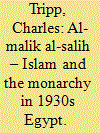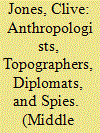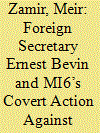|
|
|
Sort Order |
|
|
|
Items / Page
|
|
|
|
|
|
|
| Srl | Item |
| 1 |
ID:
185812


|
|
|
|
|
| Summary/Abstract |
This article examines the significance of and the motives behind the projection of a distinctively Islamic image of King Faruq of Egypt in the years that followed his ascent to the Throne in 1936. It argues that the creation of the persona of al-malik al-salih (the righteous king) was one aspect of the strategy developed by Ali Mahir Pasha (Prime Minister and then Head of the Royal Diwan) to safeguard the monarchy in an era of mass politics. The campaign, however, took on a life of its own, obliging Ali Mahir to reassert control over the image of the ‘righteous king’.
|
|
|
|
|
|
|
|
|
|
|
|
|
|
|
|
| 2 |
ID:
185814


|
|
|
|
|
| Summary/Abstract |
Recent conflicts in Iraq and Afghanistan have reawakened interest as well as controversies over how Western militaries tried to engage, with varying degrees of success, with the ‘Human Terrain’. These debates are far from new. This article explores the role played by a handful of Royal Air Force Intelligence Officers across the Aden Protectorates in the 1950s. Undoubtedly, they enjoyed notable success, not least in countering the immediate territorial avarice of Yemen and Saudi Arabia. But they remained agents of an empire in retreat, their effectiveness in harnessing a granular knowledge of the tribal landscape to the delivery of aerial violence being buffeted by an environment that they could not shape and over which, despite their best endeavours, Aden could exercise little control.
|
|
|
|
|
|
|
|
|
|
|
|
|
|
|
|
| 3 |
ID:
185813


|
|
|
|
|
| Summary/Abstract |
The principle of civilian control over the military and the secret services is essential for healthy democracies. That principle was challenged under the Labour government in Britain from 1945-1951, when the military and MI6 in the Middle East conducted their own parallel ‘defence policy’ using deception and misinformation, not only against their country’s enemies, but against their own elected government. The outcome was a divided and confused foreign policy in a region that was considered vital to Britain’s strategic interests. This research, which is based on sources from French, British, American and Israeli archives, as well as Syrian and other Arab documents, sheds light on the covert action of MI6 officers operating from their headquarters in Cairo with the backing of high-ranking officers in the Middle East Command, to subvert France's colonial rule in North Africa. Their clandestine activities contradicted the policy of Foreign Secretary Ernest Bevin, who sought to amend his country’s relations with France after their clash in Syria in the summer of 1945, and integrate it in an anti-Soviet European alliance. The MI6 Arabists' covert action in French North Africa serves as a case study to re-evaluate Bevin’s control of the organization, which was ostensibly accountable to him. The article questions Bevin’s reputation as a powerful Foreign Secretary who dominated the Foreign Office, and raises doubts about his ability to oversee MI6’s clandestine operations in the Middle East.
|
|
|
|
|
|
|
|
|
|
|
|
|
|
|
|
| 4 |
ID:
185816


|
|
|
|
|
| Summary/Abstract |
Following the September 2001 (9/11) Al-Qaeda attacks on the United States the terror threat posed by transnational non-state violent actors rose to the top of the international security agenda. This article examines the evolution of counter-terror cooperation between member states of the Gulf Cooperation Council in the five years that followed the unprecedented 9/11 attacks. In doing so, it will examine the types of counter-terror cooperation available to members of a regional organization (RO), as well as the obstacles that they face in developing effective counter-terror cooperation capabilities. It will then provide an analysis of GCC counter-terror cooperation in the period under study contrasting, where relevant, the GCC’s counter-terror responses with those of two other leading regional organizations in the international system – the EU and ASEAN.
|
|
|
|
|
|
|
|
|
|
|
|
|
|
|
|
| 5 |
ID:
185810


|
|
|
|
|
| Summary/Abstract |
Sylvia Kedourie, in a 1955 piece, analysed the ideological point of contact between Arab nationalism and Islam, in so doing highlighting the distinctions between watan and umma in linguistic patterns and ideological significance. In this piece, using the starting point of Kedourie's prescient examination, I trace the ways in which such a linguistic shift from umma to watan has followed a broader pattern towards the localization of Islamist factions, perhaps best illustrated by the example of the Muslim Brotherhood in the Arabian Peninsula.
|
|
|
|
|
|
|
|
|
|
|
|
|
|
|
|
| 6 |
ID:
185811


|
|
|
|
|
| Summary/Abstract |
It is not often that one comes across a former British intelligence chief venting his spleen in public about past injuries done to him by his government and, in doing so, revealing recent intelligence operations. One such instructive example is that of Major-General Sir Wilfrid Malleson who, on 24 January 1922, in a lecture to the Central Asian Society, castigated the British government of India for failing to recognise the admittedly impressive services of the personnel of the British military mission to Turkestan from 1918-20, which had been under his command. In his righteous fury, Malleson revealed to a large extent British military and intelligence operations in the region, particularly as they affected Afghanistan in the critical years of 1919-20, covering as they did the Third Afghan War and its aftermath. It is proposed in this article to concentrate on an examination of this subject since it has been comparatively neglected and has much to tell us about the nature of British intelligence in this period and place.
|
|
|
|
|
|
|
|
|
|
|
|
|
|
|
|
| 7 |
ID:
185815


|
|
|
|
|
| Summary/Abstract |
After all, the ruler and the dynasty and the Syrian state’s institutions have won the battle, but it is doubtful whether this is the victory of a ‘Syrian identity’ that the Syrian regime has sought to promote in recent decades. It seems, therefore, that the built-in tension between the components of the Syrian state identity remains the same and so do the doubts regarding the degree of identification and commitment of the Syrians to their country. Thus, the question of identity, which has been a key question throughout Syrian history, remains a relevant question for the future of the Syrian state.
|
|
|
|
|
|
|
|
|
|
|
|
|
|
|
|
| 8 |
ID:
185809


|
|
|
|
|
| Summary/Abstract |
This special issue is dedicated to the memory of Sylvia Kedourie, who maintained her editorship of this journal from 1992-2016. Of course, she had been closely involved with the journal since its foundation by her husband, Elie, in 1964. Yet, following his premature death in 1992, she continued the editorship, aided by her daughter, Helen, who continues the Kedourie connection with the journal to this day. As most of the contributors to this special issue can testify, Sylvia was very much a hands-on editor. She read all the submitted articles and edited and proofed those that were accepted for publication. She continued to do this right till the end of her long life. She was, rightly, insistent that the highest standard of scholarship should always be maintained by the journal. She kept in touch with her contributors, often welcoming them to her London home in Lawn Road. She was keen to encourage younger scholars to publish with the journal and even invited some of them to join the editorial board. She took a personal interest in them and was always ready to give advice when it was required. She had an infectious sense of humour and would delight in telling a joke, always accompanied by a chuckle. After being fed with sandwiches and coffee, one always came away from Lawn Road with an armful of books to review, pulled from the tottering towers of paper and publishers’ volumes in her library. Literally, she lived for the journal.
|
|
|
|
|
|
|
|
|
|
|
|
|
|
|
|
| 9 |
ID:
185817


|
|
|
|
|
| Summary/Abstract |
Energy supplies have become a critical and controversial issue in global politics. On the one hand, they create complex problems of dependency between producer and consumer nations, and between both of them when pipelines for oil or gas cross the territory of third parties. Since the dramatic oil price rises of 1974, the price of energy traded internationally has also become a crucial factor in the global economy. Finally, the potentially disastrous impact of global warming has put the need to switch away from fossil fuels to renewable energy sources at the top of the international agenda
|
|
|
|
|
|
|
|
|
|
|
|
|
|
|
|
|
|
|
|
|